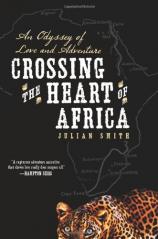Reading Group Guide
Discussion Questions
Crossing the Heart of Africa: An Odyssey of Love and Adventure

1. Much of the book is a meditation on being a lone outsider in places and cultures that are unfamiliar, at times almost alien. Discuss your own experiences in foreign places and cultures --- unexpected things you encountered, intriguing people you met, ways you coped with being a stranger in a strange land.
2. The author writes that “Africa has always been a concept as much as a place” to the outside world. Discuss this idea. Why do you think it holds such a strong grip on the imagination? What are some of the most common clichés and stereotypes? Did the book change your views of this part of the continent or the people who live there today?
3. The author paints a “warts and all” portrait of Grogan, showing him as a gifted, confident hero but also an obstinate, impatient person who can wound and offend those close to him. Discuss your impression of him --- was it more positive or negative? Did it change over the course of the book and his life? Is Grogan someone you’d like to meet, or have as a friend or business associate?
4. Before leaving for his trip, Smith says he loves his fiancée Laura and knows she is “The One,” but is still afraid of making a lifetime commitment. Is this inherently contradictory, a kind of emotional oxymoron? Why do you think some men hesitate in the face of marriage? Are they more likely to than women are?
5. Both Grogan’s and the author’s motivations for traveling through Africa seem simple on the surface --- the love of a woman --- but on closer inspection are really much more complex. How do you think their deeper motivations are alike, and how are they different? Are the romantic explanations disingenuous?
6. Consider the quote by John Steinbeck that opens part three: “A journey is like marriage. The certain way to be wrong is to think you control it.” Do you agree with this? Why or why not? How is taking a long trip like being in a long-term relationship, or not?
7. The portrait of Smith’s relationship with his fiancée is obviously only one side of the story. How different do you think things looked from Laura’s perspective? What is your impression of her character and the choices she made during over course of their relationship?
8. One of the lowest points in Grogan’s journey was when his partner Harry Sharp decided to leave and go home to London. Do you think, in the long run, this was actually for the best? Is someone like Grogan really better off on his own? Have you ever felt unexpectedly deserted like this --- and how did things eventually turn out?
9. The book contrasts many of the same places in Africa seen a century apart. What are the major ways the continent seems to have changed since Grogan passed through, and what are the major similarities? Were any of these particularly surprising to you?
10. Grogan didn’t pursue lifelong fame after his journey, though he could have, instead moving to Africa with Gertrude and dying more or less in obscurity. Was this a surprise, and why do you think he chose this quieter path? Discuss the costs and benefits, compared to a life in the spotlight, from both his perspective and yours.
11. Grogan’s attitudes and actions toward both animals and Africans were complex and, at least by modern standards, often appalling. Discuss how his thinking changed over the course of his life, and how it affected your opinion of his character. Is calling him “a product of his times” any excuse for his worst behavior?
12. In the epilogue, Smith writes that “it makes me a little sad to sense our old freedoms fading” after the birth of their daughter, but also how “new opportunities have replaced old ones, and the list is even longer now.” If you have children, what do you think of these statements? Did you feel like becoming a parent, in a way, meant exchanging of old freedoms for new opportunities? If so, was this a difficult adjustment --- and was is worth it?
Crossing the Heart of Africa: An Odyssey of Love and Adventure
- Publication Date: December 7, 2010
- Paperback: 344 pages
- Publisher: Harper Perennial
- ISBN-10: 0061873470
- ISBN-13: 9780061873478







